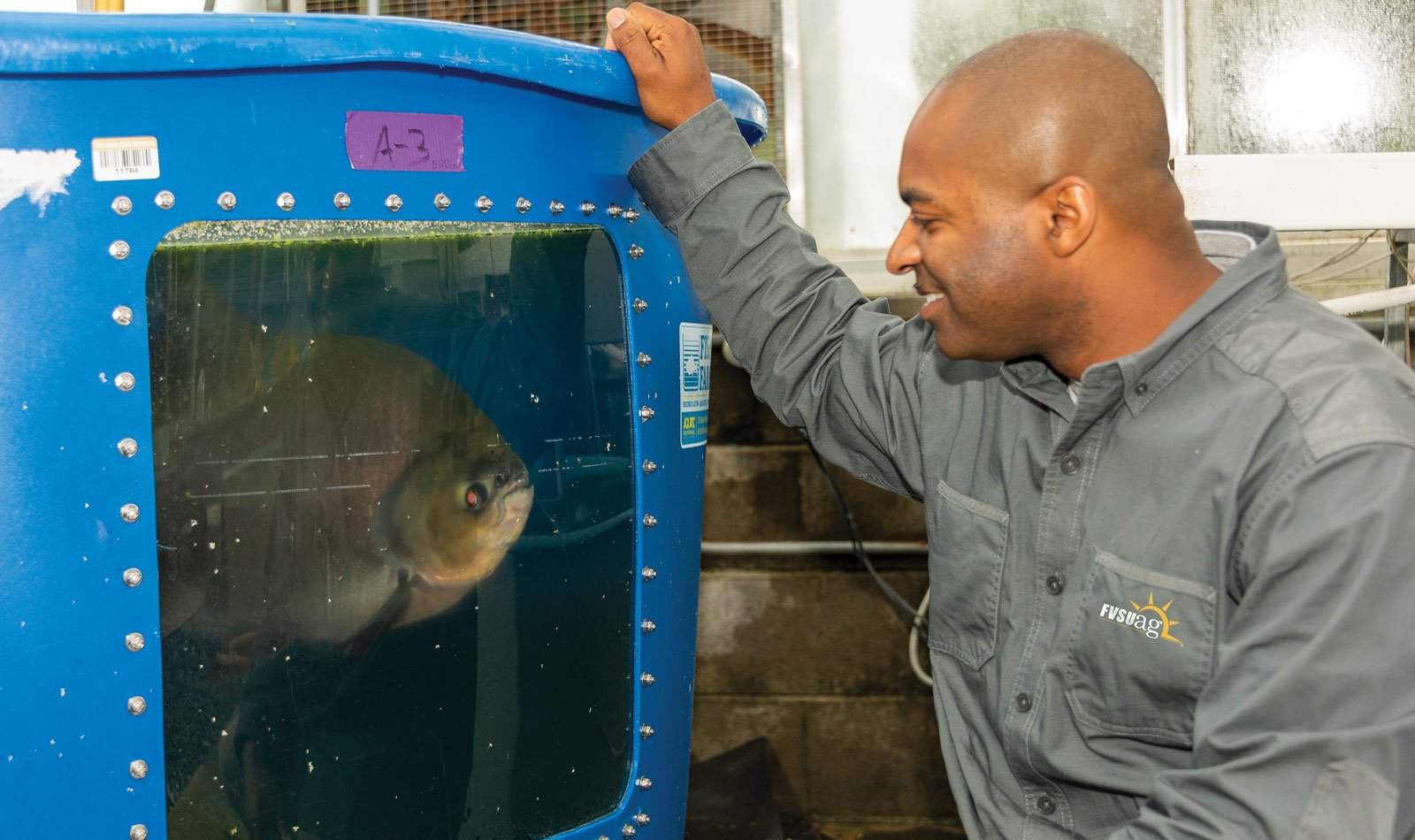An emerging farming technique that requires fish and water could shape the future of food production.
Aquaculture is the process of rearing, breeding and harvesting aquatic species. Instead of the traditional method of growing fish outdoors in open ponds, recirculation aquaculture systems are unique ways to farm fish in indoor tanks with a controlled environment.
Donald Bacoat, aquaculture carpenter and production assistant for Fort Valley State University’s Cooperative Extension Program, emphasized the significance of fish farming.
“As our populations continue to grow, we cannot get enough aquatic life from the wild to sustain us,” he said. “Consequently, in the United States, the amount of seafood consumption has been steadily rising. Ten years ago, we were getting more fish from the wild. As time progresses, we are producing more aquaculture food because that is pretty much our only viable option.”
FVSU’s aquaculture facility and on-campus greenhouse serve as educational spaces for farmers, students and interested citizens to tour and learn about the benefits of aquaculture and the process of starting a fish farm. The tanks hold tilapia, koi, crayfish, prawns, shrimp, sea urchins, bluegills, bass, minnows and catfish. This includes visitors’ favorite pacu fish called Gill. She is 3-feet long and loves eating fruit and nuts.
Through yearly trainings, Bacoat advises farmers about plant and fish care, water quality and construction of aquaculture systems. He also gives demonstrations at schools all over Georgia and at various community events such as the Sunbelt Agricultural Exposition in Moultrie, Georgia.
Specializing in aquaculture since 2005, his advice to farmers interested in fish farming is to start small. “It is not difficult. It is a matter of throwing yourself in there,” Bacoat said.
The FVSU aquaculture specialist described aquaponics and hydroponics as two different practices that are under the umbrella of aquaculture. “Aquaponics is farming fish and plants together in a water medium. However, in hydroponics, you are growing plants in a water medium. There is no soil, and the fertilizer is in liquid form,” he explained.
Bacoat said farmers should take advantage of aquaculture because Georgia does not have a dominant aquaculture industry. “There are numerous aquaculture opportunities that farmers could invest in to make money,” he advised.
Secondly, aquaculture allows farmers to produce healthy food. “It is advantageous for people to grow their own fish to ensure they are getting quality, uncontaminated fish,” Bacoat said.
Furthermore, he recommends new farmers joining the Georgia Aquaculture and Aquaponics Network (GAAN). This nonprofit organization meets monthly on FVSU’s campus and is open to all farmers interested in aquaculture. Bacoat said most of the members are retired and come as far as Alabama and coastal Georgia to meet as a group.
“The purpose is to advance aquaponics. We talk about our mistakes and learn from each other,” he said.
GAAN member Keita Dawson of Ula Farms runs a successful aquaponics farm in Gray, Georgia. Her dream of starting the farm three years ago also sparked the interest of her husband, Calvin (retired Army), and their 12-year-old son, Conrad. She named the farm after her late mother-in-law, Ula.
Prior to coming to Georgia, the married couple lived near Mililani, Hawaii, home to one of the largest aquaponics farms in the United States. After visiting the farm, they decided this was something they wanted to do.
Dawson’s main reason for starting an aquaponics farm was to be self-sufficient and to provide her family with highly nutritious vegetables year-round. They grow various microgreens such as broccoli, parsley, garlic chives and cilantro. The farm is certified naturally grown. They do not use any soil to grow their food, nor do they use any chemicals or pesticides (trapping methods only). There are two tanks, each containing 90 bluegills, that filter water to the different varieties of lettuce in the hoop house.
Dawson said they began selling their produce two years ago. For the first six months, they only had about five customers. Today, they sell to more than 30 hotels and restaurants in Macon and northward, who compliment them on the fresh and delicious taste of their products. This family-oriented business also gives back to the Macon community. They donate lettuce to the Rescue Mission and other nonprofit organizations.
“We always thank God for what we have and put him first,” Dawson said. “We treat people the way we want to be treated.”
The aquaponics farmer said she has benefited in many ways from being a GAAN member and from Bacoat’s expertise on freshwater fish.
“This type of farming is emerging technology. There is no set standard. I treasure being a part of a group that can guide me, and I can guide them on my experiences,” she said. “We are friends even outside the aquaponics arena.”
For more information about aquaculture, contact Bacoat at (478) 825-6768 or bacoatd@fvsu.edu.

